In this Sunday, Sept. 22, 2019, photo, protesters walk on a Chinese national flag during a protest at a mall in Hong Kong. China's decision to impose a national security law on Hong Kong is raising questions about the future of the semi-autonomous Chinese territory. The move bypasses Hong Kong's government _ which has not been able to enact such a law despite a requirement that it does _ and could allow the stationing of Chinese security officers in the city. A look at what it means and why people are concerned. (AP Photo/Kin Cheung)
The Associated Press
BEIJING (AP) - China is taking matters into its own hands after last year's tumultuous anti-government protests in Hong Kong that often descended into tear gas-filled clashes.
In a surprise move, the central government announced last week that it would develop laws to outlaw secession, subversion, terrorism and foreign interference in Hong Kong. The National People's Congress is expected to ratify the bill Thursday, and legislation could be finalized this summer.
China's decision raises questions about the future of the semi-autonomous territory. Will China station its feared state security officers in the city? Does it signal an erosion or the end of the 'œone-country, two-systems'ť framework that gives Hong Kong a high degree of local autonomy?
The devil is in the details. And they haven't come out yet.
'œThere are still a lot of important questions we have, which have not been answered,'ť said Joseph Cheng, a political scientist and veteran of Hong Kong's pro-democracy movement.
BEIJING'S BOMBSHELL
The proposal the Congress is set to approve is really a guideline for future steps. It tasks the legislature's Standing Committee, a smaller body with decision-making authority, with developing specific laws at future meetings.
Two items in the seven-article draft are getting particular attention. One is the possible deployment of state security. The other is the bypassing of Hong Kong's legislature by crafting and approving the laws in Beijing.
The Hong Kong government is required to enact national security legislation under Article 23 of the Basic Law, its constitution, but has been unable or unwilling to do so because of opposition. An attempt in 2003 was abandoned in the face of huge protests.
China dropped its bombshell the day before the opening of the annual National People's Congress last week. In the wake of last year's protests, the most violent since China took back the former British colony in 1997, it said it was stepping in.
Technically, the central government can do this, but it doesn't look good. Article 18 of the Basic Law says that the congressional Standing Committee can add laws on defense, foreign affairs and other matters outside Hong Kong's autonomy. National security falls into that.
For Cheng and others in the pro-democracy camp, the move is the latest in a series of steps that mean the end of 'œone-country, two systems.'ť But, he said, 'œWe have to admit that this is legal."
CONCERN OVER ARRESTS
After the initial announcement, the biggest shock came in Article 4 of the proposal, which reads in part: 'œWhen needed, relevant national security organs of the Central People's Government will set up agencies in (Hong Kong) to fulfill relevant duties to safeguard national security.'ť
Speculation swirled. Would Chinese police be able to arrest people in Hong Kong? Would arrested protesters be questioned by both local and national police?
'œThis may be worrisome. It depends on what the bill says about what powers these people have," said Albert Chen, a constitutional law scholar at Hong Kong University and member of a committee that advises the congressional Standing Committee on the Basic Law.
'œIf these people have powers of arrest, of search of people's home or offices, I think people would find it very difficult to accept that,'ť he said.
Details may emerge at upcoming committee meetings in late June and late August.
DIVIDE DEEPENS
The protests in Hong Kong and the reaction in Beijing illustrate a fundamental divide that has once again bubbled to the surface.
The freedom of expression and other rights that Hong Kong residents have under 'œone country, two systems'ť allow for protests and public criticism of the government. It can, at times, be messy.
China's ruling Communist Party sees stability as vital to maintaining its grip on the country, including the territories of Hong Kong and nearby Macao.
'œOne country, two systems'ť is not about to disappear. Hong Kong will continue to manage most of its local affairs, from taxation to common crime. But Beijing is poised to wield an increasingly heavier hand when it comes to dissent and any possible challenges to its ultimate control of Hong Kong.
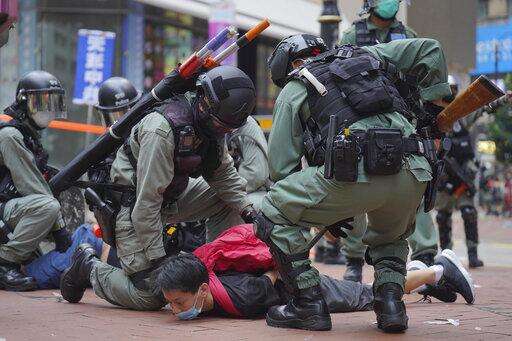
FILE - In this file photo taken Sunday, May 24, 2020, riot police detain a protester during a demonstration against Beijing's national security legislation in Causeway Bay in Hong Kong. China is taking matters into its own hands after months of tumultuous anti-government protests in Hong Kong last year that often descended into tear gas and clashes. In a surprise move, the central government announced last week that it would develop laws to outlaw secession, subversion of state power, terrorist acts and foreign interference in Hong Kong. The National People's Congress is expected to ratify the move Thursday, and the laws could be finalized this summer. (AP Photo/Vincent Yu, File)
The Associated Press
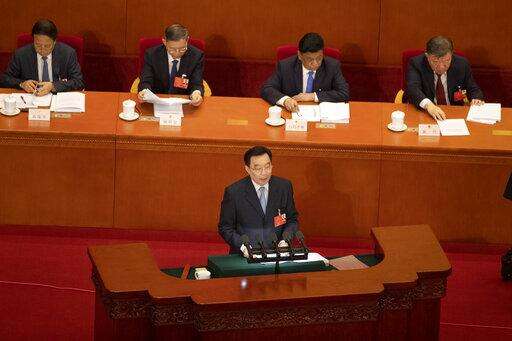
In this photo taken Friday, May 22, 2020, Wang Chen, vice chairman of the Standing Committee of the National People's Congress (NPC) explains the draft decision on establishing and improving the legal system and enforcement mechanisms for the Hong Kong Special Administrative Region (HKSAR) to safeguard national security submitted to China's national legislature for deliberation during the opening session of the National People's Congress held at the Great Hall of the People in Beijing. China is taking matters into its own hands after last year's tumultuous anti-government protests in Hong Kong that often descended into tear gas-filled clashes. (AP Photo/Ng Han Guan)
The Associated Press
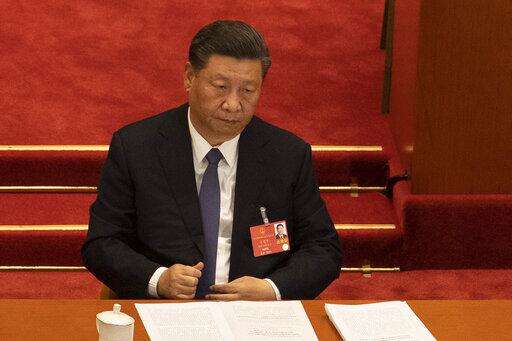
In this photo taken Friday, May 22, 2020, Chinese President Xi Jinping attends the opening session of the National People's Congress held at the Great Hall of the People in Beijing. China is taking matters into its own hands after last year's tumultuous anti-government protests in Hong Kong that often descended into tear gas-filled clashes. (AP Photo/Ng Han Guan)
The Associated Press
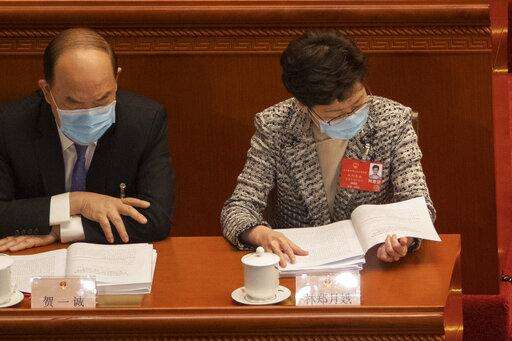
In this photo taken Friday, May 22, 2020, Hong Kong Chief Executive Carrie Lam reads a draft decision on establishing and improving the legal system and enforcement mechanisms for the Hong Kong Special Administrative Region (HKSAR) to safeguard national security submitted to China's national legislature for deliberation during the opening session of the National People's Congress held at the Great Hall of the People in Beijing. China is taking matters into its own hands after months of tumultuous anti-government protests in Hong Kong last year that often descended into tear gas and clashes. In a surprise move, the central government announced that it would develop laws to outlaw secession, subversion of state power, terrorist acts and foreign interference in Hong Kong. (AP Photo/Ng Han Guan)
The Associated Press
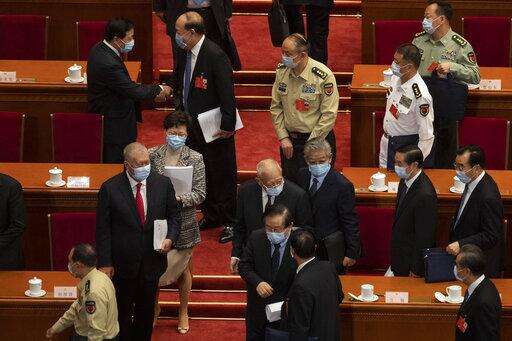
In this photo taken Friday, May 22, 2020,Hong Kong Chief Executive Carrie Lam, third from left leaves after attending the opening session of the National People's Congress held at the Great Hall of the People in Beijing. China is taking matters into its own hands after months of tumultuous anti-government protests in Hong Kong last year that often descended into tear gas and clashes. In a surprise move, the central government announced during the session that it would develop laws to outlaw secession, subversion of state power, terrorist acts and foreign interference in Hong Kong. (AP Photo/Ng Han Guan)
The Associated Press
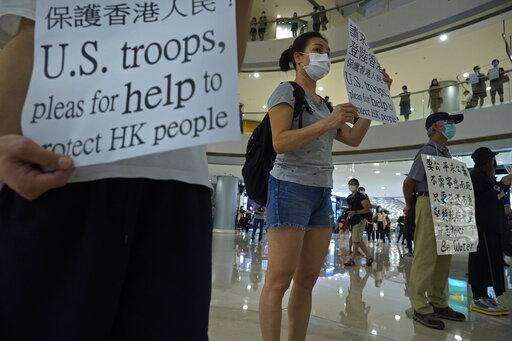
FILE - In this file photo taken Monday, May 25, 2020, protester display placards in a shopping mall during a protest against China's proposed tough national security legislation for the city in Hong Kong. China is taking matters into its own hands after months of tumultuous anti-government protests in Hong Kong last year that often descended into tear gas and clashes. In a surprise move, the central government announced last week that it would develop laws to outlaw secession, subversion of state power, terrorist acts and foreign interference in Hong Kong. The National People's Congress is expected to ratify the move Thursday, and the laws could be finalized this summer. (AP Photo/Vincent Yu, File)
The Associated Press
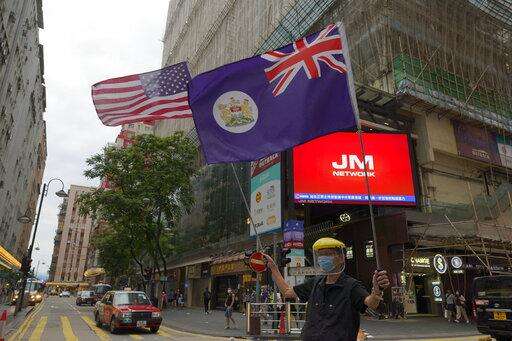
FILE - In this file photo taken Sunday, May 24, 2020, a protester wave a U.S. national flag and a Hong Kong colonial flag during a protest against Beijing's national security legislation in Causeway Bay in Hong Kong. China is taking matters into its own hands after months of tumultuous anti-government protests in Hong Kong last year that often descended into tear gas and clashes. In a surprise move, the central government announced last week that it would develop laws to outlaw secession, subversion of state power, terrorist acts and foreign interference in Hong Kong. The National People's Congress is expected to ratify the move Thursday, and the laws could be finalized this summer. (AP Photo/Vincent Yu, File)
The Associated Press
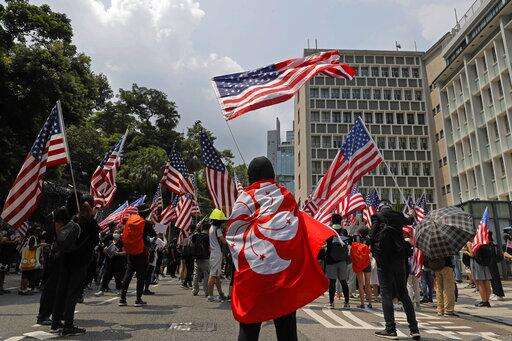
In this Sunday, Sept. 8, 2019 photo, protesters carry Hong Kong flag and U.S. flags during a demonstration near the U.S. Consulate in Hong Kong. China's decision to impose a national security law on Hong Kong is raising questions about the future of the semi-autonomous Chinese territory. The move bypasses Hong Kong's government _ which has not been able to enact such a law despite a requirement that it does _ and could allow the stationing of Chinese security officers in the city. A look at what it means and why people are concerned. (AP Photo/Kin Cheung)
The Associated Press